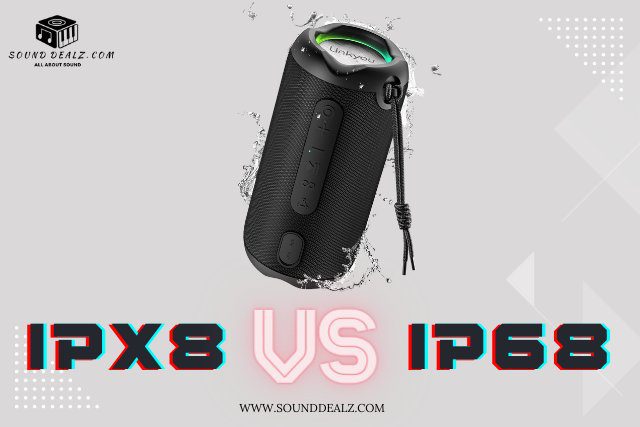The IPX8 and IP68 rating tells you how safe a device is and what it is safe from. What is the difference between them? Check out our guide on the difference between IPX8 and IP68 below.
What is IPX8?

IPX8 is a water resistance rating that is defined by the International Electrotechnical Commission (IEC). It is part of the IP (Ingress Protection) rating system, which classifies how well electronic devices are protected against dust and water.
The first digit of an IP rating indicates the dust protection level, while the second digit indicates the level of water protection. IPX8 has an X in the first digit, meaning it has not been tested for dust protection. However, it has the highest possible rating for water protection, meaning it is protected against continuous immersion in water.
During testing, IPX8-rated devices are typically submerged in water for 30 minutes at a depth of 1 meter (3.3 feet). However, some manufacturers may test their devices to deeper depths or for more extended periods. It is important to note that IPX8 does not guarantee that a device is completely waterproof.
What is IP68?

As you know, the first digit of an IP rating indicates the dust protection level, while the second digit indicates the level of water protection. IP68 has a value of 6 in the first digit and 8 in the second digit, which means that IP68 has the highest possible rating for dust and water protection. IP68-rated devices are typically submerged in water for 30 minutes at a depth of 1.5 meters (5 feet) during testing.
IPX8 vs IP68 Rating: Quick Comparison Table
| Feature | IPX8 | IP68 |
|---|---|---|
| Water Resistance | Protected against continuous immersion in water | Protected against continuous immersion in water |
| Depth Variability | Typically tested to a depth of 1 meter (3.3 feet) for 30 minutes | Typically tested to a depth of 1.5 meters (5 feet) for 30 minutes, but may vary depending on the manufacturer |
| Duration of Immersion | Testing duration varies (30 mins to 4 hours approx) | Testing duration varies (30 mins to 4 hours approx) |
| Dust Resistance | Not rated | Dust-tight |
| Dust Ingress | Possible | Not possible |
| Typical Products | Smartphones, smartwatches, fitness trackers, Bluetooth speakers, headphones, digital cameras, action cameras | Smartphones, smartwatches, fitness trackers, Bluetooth speakers, headphones, digital cameras, action cameras, rugged laptops and tablets |
IPX8 vs IP68 Rating: Detailed Comparison
Here is the detailed comparison of IPX8 vs IP68 Rating.
Water Immersion Capability
IPX8-rated devices are protected against continuous immersion in water. This means that they can be submerged in water to a depth of 1 meter (3.3 feet) that varies from 30 minutes to 4 hours or more based on the manufacturer.
On the other hand, the IP68 rating has both water and dust resistance, specifying a higher level of protection. Like IPX8, the IP68 rated devices can also be submerged in water to a depth of 1 meter (3.3 feet) that varies from 30 minutes to 4 hours or more based on the manufacturer.
Dust Resistance
IPX8 has an X in the first digit, which means that it has not been tested for dust protection. However, IP68 has the highest possible rating for dust protection which means that the device is dust-tight and completely protected from dust and other particles. It is also protected against continuous immersion in water.
Related Products
IPX8 is often found on underwater cameras, Bluetooth speakers, and diving watches, among other things, where water protection is very important. It is designed to submerge these items in water without losing their usefulness.
Most of the time, IP68 is found on electronics that must be immune to water and dust. Smartphones, smartwatches, fitness trackers, e-readers, and wireless earbuds all work well with this grade.
IPX8 vs. IP68 Rating: Which One is Best
It depends on your needs. If you need a device that can withstand water exposure but doesn’t need dust protection, then an IPX8-rated device is a good choice. For example, if you plan on using your device in the pool or shower but don’t need it in a dusty area, then an IPX8-rated device is sufficient.
If you need a device that can be used in water and dust, then an IP68-rated device is a better choice. For example, if you plan on using your device in a dusty environment, such as a construction site or a beach, then an IP68-rated device is ideal.
FAQs
Is IPX8 fully waterproof?
No, IPX8 is not fully waterproof. It is protected against continuous immersion in water. However, it may still be damaged if exposed to extreme conditions, such as high-pressure water jets or prolonged immersion in water.
What is better than IP68?
There is no higher IP rating than IP68. It is the highest possible rating for both dust and water protection.
Which is better IP68 vs IPX7?
IP68 is better than IPX7 because it also offers dust protection. IPX7 is only rated for water protection.
Is IP68 the highest waterproof rating?
Yes, IP68 is the highest waterproof rating.
It is important to note that IP ratings are not guarantees that a device is completely waterproof or dust-tight. It is always best to read the manufacturer’s instructions carefully and to use your device in accordance with its intended use.
Conclusion
In the end, it is concluded that choosing between IPX8 and IP68 ratings depends on your priorities. The IPX8 is only water-resistant. However, IP68 is both water and dust-protected.
Therefore, if you want to use your device only on the beach or pool, then IPX8 is best for you. On the other hand, if you want to use your device in both water and dusty environments, then you should choose IP68. I hope this article will help you understand the difference between IPX8 and IP68.
Related Posts:

